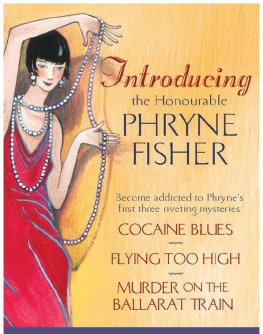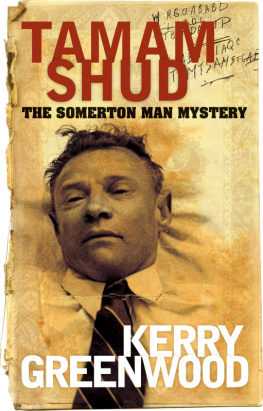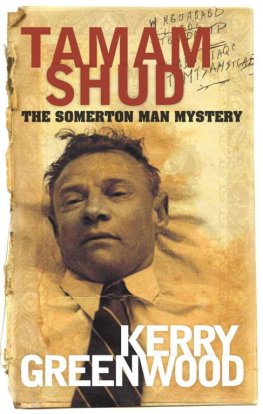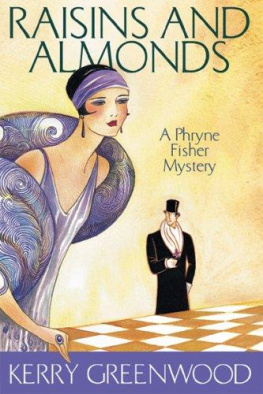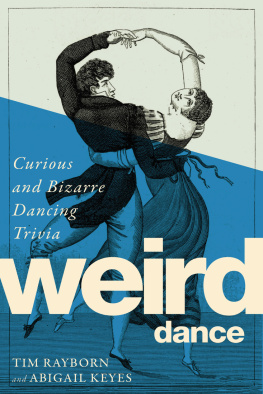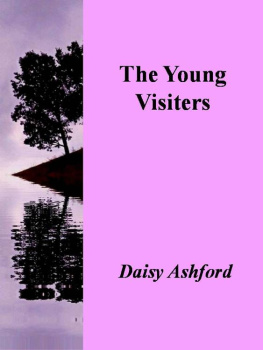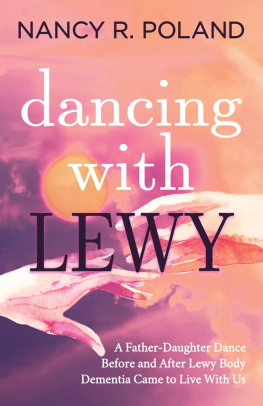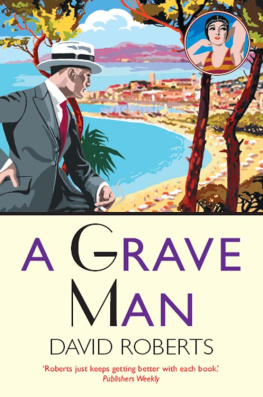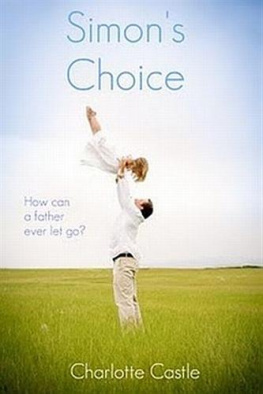Kerry Greenwood - Raisins and Almonds
Here you can read online Kerry Greenwood - Raisins and Almonds full text of the book (entire story) in english for free. Download pdf and epub, get meaning, cover and reviews about this ebook. genre: History. Description of the work, (preface) as well as reviews are available. Best literature library LitArk.com created for fans of good reading and offers a wide selection of genres:
Romance novel
Science fiction
Adventure
Detective
Science
History
Home and family
Prose
Art
Politics
Computer
Non-fiction
Religion
Business
Children
Humor
Choose a favorite category and find really read worthwhile books. Enjoy immersion in the world of imagination, feel the emotions of the characters or learn something new for yourself, make an fascinating discovery.

- Book:Raisins and Almonds
- Author:
- Genre:
- Rating:5 / 5
- Favourites:Add to favourites
- Your mark:
- 100
- 1
- 2
- 3
- 4
- 5
Raisins and Almonds: summary, description and annotation
We offer to read an annotation, description, summary or preface (depends on what the author of the book "Raisins and Almonds" wrote himself). If you haven't found the necessary information about the book — write in the comments, we will try to find it.
Raisins and Almonds — read online for free the complete book (whole text) full work
Below is the text of the book, divided by pages. System saving the place of the last page read, allows you to conveniently read the book "Raisins and Almonds" online for free, without having to search again every time where you left off. Put a bookmark, and you can go to the page where you finished reading at any time.
Font size:
Interval:
Bookmark:

Raisins and Almonds
Phryne Fisher #9
Kerry Greenwood
DEDICATED TO JEAN GREENWOOD
incomparable
with thanks to Dennis, Mark and Benjamin Pryor, Arnold Zable, Ashley Halpern, Lily Grossman aleha ha-shalom, David Greagg, Jenny Pausacker, Richard Revill, J. Cosmo Newberry III, Lee Kennedy and Susan Tonkin.
Beneath my little one's cradle
Stands a clear white goat
The goat set off to trade
In almonds and raisins.
There will come a time, my child
When you will journey far and wide
Remember this song I sing today
As you travel on your way.
Raisins and Almonds are laden with spice
You will trade in merchandise.
This is what my child will do.
Sleep, my child, lue-lue-lue.
from Rozhenkes mit Mandlen
(Raisins and Almonds),
Yiddish lullaby,
translated by Arnold Zable.
The ranked books exhaled leather and dust, a comforting scent. The noise of the Eastern Market, the roar of traffic and voices and feet was almost inaudible inside Lee's Books New and Secondhand prop. Miss Sylvia Lee, a haven of peace and scholarship at the top of the city. Miss Lee's shop was always ordered, always quiet, and always scented with the gum leaves she bought from Miss Ireland on the upper floor: an arrangement of gum leaves and poppies was her favourite decoration, and when there were no poppies she made do with gum leaves alone. She specialized in abstruse works in Latin and Greek, though her concession to popular taste was the brightest point in the shop: a table of yellow-jacketed novels for railway reading. The space was small and closely packed with volumes in leather bindings. The shelves extended to the ceiling, which was white. The room was lit by a large electric light in the middle, and a working lamp over Miss Lee's desk. Miss Lee herself wore sub fusc garments, a skirt of a dark colour and a beige or white blouse and a cardigan under her neat working smock. Her mouse-brown hair was cropped short. She lived across Exhibition Street in an apartment, a perfectly self-contained young woman who required no masculine attentions, merely wishing to get on with her own neat life in peace.
Miss Lee was adding up a column of figures. Her pencil moved smoothly up the pence, then the shillings, and she was about to write down the total when it happened, and she was never afterwards able to forget the sum of eleven pounds, twelve shillings and eight-pence halfpenny.
The tall man in the long black coat, who had been examining Volume 9 of Hansard for 1911, for which Miss Lee had long abandoned hope that someone would acquire for their library, exclaimed in a foreign tongue and dropped the book.
She dashed from behind her counter quickly enough to support him as he sank to the floor. He held out one hand, palm upwards, as though inviting her to notice its emptiness, or was it the small wound on the forefinger?
His eyes opened wide for a moment, and he spoke again. Then he convulsed, limbs flung out like a starfish, so abrupt and horribly strong that Miss Lee was forced to release him. His head hit the floor and she heard his teeth gnash, a dreadful grating noise echoed by a rattling in his throat. As she grabbed her ruler to lay between his teeth, he convulsed again and lay still.
She stood with the ruler in her hand, gripped so tightly that the edge cut into her flesh. The young man was dead, that was plain. What to do next?
She walked steadily to the door of her bookshop in the Eastern Market and said to her neighbour the teashop lady, 'Mrs Johnson, can you call a doctor? One of my customers ...'
She was proud of herself. Not a quaver in the voice. And as Mrs Johnson's scatty assistant was chivvied out of the shop to call for Dr Stein, who had consulting rooms in the next building, she walked back into her shop and sat down rather abruptly behind the counter to wait for some help. She clasped her hands together on her shabby calf-bound ledger, to stop them from shaking.
For there was nothing she could do for her customer now, and one must not give way.
Phryne Fisher was dancing the foxtrot with a sleek and beautiful young man. She was happy She was agreeably conscious that she was gorgeous, from the turn of her brocaded shoe with the Louis heel, through the smoky-grey stockings of the sheerest silk to the Poitou gown, tunic and skirt of heavy, draped, amethyst brocade threaded with a paisley pattern in silver. A silver fillet crowned her black hair, cut in a cap like a Dutch doll's. She had a huge amethyst in silver on her right hand, a wide band of engraved silver around one upper arm, and the same stones in her ears. She smelt bewitchingly of Floris honeysuckle and knew, without doubt, that her partner appreciated her. He would not, otherwise, have spent a small fortune on the purple orchid which decorated her shoulder. Another young man might have spent the money, but only a devoted and intelligent young man would have ascertained the colour of the dress on which it was to be worn.
His name was Simon Abrahams. Phryne's Chinese lover, Lin Chung, had been forced to go to Shanghai on a silk-buying trip, and Phryne found that she had rather lost her taste for plain ordinary young men. Searching for a diversion, she had collected Simon from a public dance hall. He was not conventionally good looking. His nose was high bridged, his eyes dark and set deeply into their sockets, and there were shadows under them which spoke of childhood illness. He was not tall, being a few inches above Phryne's five feet two, but he was beautifully made and stunningly dressed, and there was a flavour about himhis diamond tie pin a little too large, perhaps, his gestures emphatic beyond the usual Public School rule, his voice quick and emotionalwhich made him as exotic as a tiger lily in a bed of white daisies.
His skin was olive, his hands graceful, and he danced like an angel, which was how Phryne found herself competing in the Foxtrot Competition run by the Jewish Young People's Society at the Braille Hall, which was hung with a truly remarkable number of balloons and streamers.
Here, thought Phryne, relaxing into her partner's embrace, I am the exotic. I am thewhat was the word? I am the shiksa, the foreigner, the non-Jew, and how nice they are being to me. I wonder how much trouble the poor boy is going to get into for taking me as a partner, and not one of the nice girls his mother wants him to marry? He really does dance like a dream.
They slid to a halt and the judges conferred. A stout lady in satin nodded vigorously, and the bald gentleman next to her waved a hand wearily, as though abandoning the dispute. 'Nu?' she heard him say The dancers all stared at the judges. Balloons wavered in the hot air.
'It's decided,' said the bald gentleman. 'The best dancers are Simon Abrahams and his partner Miss Fisher, but the heat goes to Rose Weinberg and Chaim Wasserman, because they are both members of the Jewish Young People's Society.'
'Shame!' yelled Chaim Wasserman. 'If they're the best dancers, then you can't give the heat to us.'
'He's right,' said the young man to Phryne's left. The room then broke into at least three arguments, all of which had ferocious supporters. Phryne was fascinated. In an instant, everyone had an opinion and someone's ear into which to yell it. One faction was for awarding the prize to Simon and Phryne, after all, they were the best dancers and who were we to start discriminating against non-Jews, for goodness' sake? Another was to award it to Chaim and Rose, who danced well and were both members and good persons besides if you overlooked their uncle Marek, and anyway Marek was not anyone's fault except maybe God's and He presumably had a purpose in creating even such persons as Marek. A third was denouncing the chairman, not for making such a decision, but for having the bad manners to say that that was how he made it, the chairman having been a
Next pageFont size:
Interval:
Bookmark:
Similar books «Raisins and Almonds»
Look at similar books to Raisins and Almonds. We have selected literature similar in name and meaning in the hope of providing readers with more options to find new, interesting, not yet read works.
Discussion, reviews of the book Raisins and Almonds and just readers' own opinions. Leave your comments, write what you think about the work, its meaning or the main characters. Specify what exactly you liked and what you didn't like, and why you think so.

